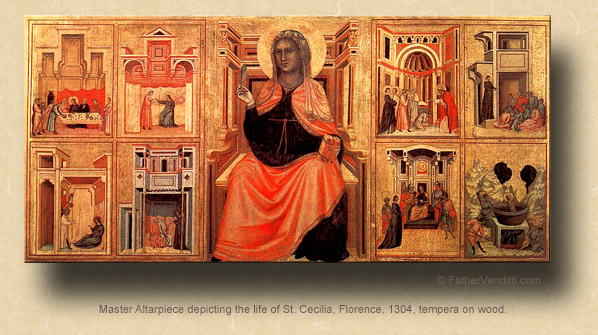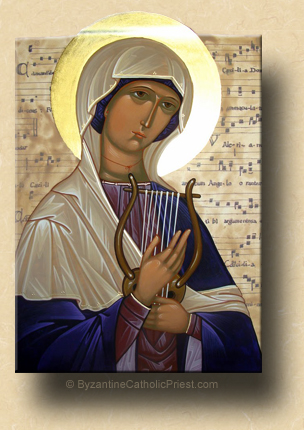There Is No Sacrifice in Giving Up What One Doesn't Want.
The Memorial of Saint Cecilia, Virgin & Martyr; or, the Thirty-Third Saturday of Ordinary Time.
Lessons from cycle II of the feria, according to the ordinary form of the Roman Rite:
Revelation 11: 4-12.
Psalm 144: 1, 2, 9-10.
Luke 20: 27-40.
Return to ByzantineCatholicPriest.com. |
10:21 AM 11/22/2014 —

Most of the time, when we see our Lord engaging in some sort of theological debate, it's with the Pharisees; but, today's Gospel lesson presents to us one of those rare occasions in which He condescends to engage the Sadducees; I say condescends because ordinarily our Lord avoids these particular rabbis, and they Him, and for good reason. The Sadducees represent the “old guard” as it were, the ultra-traditionalist wing of the rabbinical class. By that I don't mean that they were overly strict—if anything, the Pharisees were much more rigorous in their interpretation of the Law and the Prophets—but that they represented Jewish theology frozen at a time about three hundred years or so before the birth of our Savior.
There were a lot of things that distinguished the theology of the Sadducees from the more contemporary Pharisees, but the most striking would probably be their adherence to the understanding prevalent throughout most of the Old Testament that there is no such thing as an afterlife. We find that shocking because we can't conceive of practicing any kind of religion without some sort of promise of happiness to come; but, if you look at the Old Testament, God's covenant with His people is always a quid pro quo in the here and now: if Abraham worships Him, God will make him the father of many nations; if they follow Moses out of bondage and accept from him the law, God will give them a land flowing with milk and honey. The reward for being faithful to God is always something that's going to happen to them while they're still here. The first time anything resembling an afterlife appears is at the tail end of the Old Testament in Maccabees, when Judas Maccabeus takes up the collection for the dead, and this is right around the time that a new party of rabbis is coming into its own, called the Pharisees, and this is just before the advent of our Blessed Lord.
At the time of our Lord, the Sadducees were on their way out, and the Pharisees were pretty much the soup of the day, and you can understand why: life for the Jews in Palestine was pretty miserable; their country was occupied by an imperial power, they had no freedom, their once great Kingdom was only a memory, the glories of Solomon and Samuel and David were now bedtime stories they told their children;  so, the promise of a resurrection from the dead and a life to come after this one is all they had to cling to, and the Sadducees couldn't compete with that; the idea that was the constant thread through most of the Old Testament—that if they kept the covenant God would reward them in their lifetime—wasn't materializing; all they had to do was look around and realize that. so, the promise of a resurrection from the dead and a life to come after this one is all they had to cling to, and the Sadducees couldn't compete with that; the idea that was the constant thread through most of the Old Testament—that if they kept the covenant God would reward them in their lifetime—wasn't materializing; all they had to do was look around and realize that.
But the Sadducees were still around; once in a great while they poked their heads out of their holes to approach our Lord and challenge him because it was pretty clear that, in spite of the many arguments over fine points in the Law that our Lord had with the Pharisees, his preaching and that of his disciples was clearly out of the Pharisaical tradition. Many times the Gospels show our Lord worshiping and praying in a Synagog, but the Synagog was an invention of the Pharisees, so that the people wouldn't have to go the Temple on the Sabbath. The Sadducees thought the Synagog was a reckless innovation, and that everyone should go the Temple. So, you can understand why our Lord and the Sadducees usually avoid one another. In Matthew 23: 2, when our Lord enjoins the people to “practice and observe” whatever the Scribes and Pharisees tell them—just not to follow their example—it's a deliberate swipe at the Sadducees.
So, in today's Gospel lesson, a few of these sad sack Sadducees approach our Lord to debate with Him about their favorite topic, the resurrection of the dead, which they believe is a heresy. The argument they put forth is absurd on its face. Lifting the prescription from Leviticus that required a man to marry his brother's widow if he should die without issue, they concoct this convoluted scenario about a woman going through seven brothers without having a child, then ask our Lord: If you believe in a resurrection like the Pharisees, then whose wife is she going to be in this mythical afterlife you people believe in? They don't want an answer; they just want to ridicule our Lord, and score points against their enemies the Pharisees at the same time.
Our Lord, Who knows his Torah better than anyone, is able to make short work of them without much difficulty by citing the relevant passage from the Book of Exodus; to be fair, any Jewish boy fresh out of Bar Mitzvah class would have been able to come up with a come back to this nonsense. But in the course of doing so, our Lord takes the occasion to point out that marriage is a blessing and a grace given for this world only, and that those who have forsaken it for the sake of the Kingdom are, to that extent, already living as the angels do in heaven. This was not part of the teaching of the Pharisees; this was something new, and His words have become one of the principle passages cited in defense of both the vow of chastity taken by those in religious life and the promise of celibacy made by priests.
We must never make the mistake of thinking that the reason for priestly celibacy is pragmatic: to make the priest more accessible or preserve his ministry from getting sidetracked by distractions. A priest is celibate because a priest should be as holy as possible because of what he does at the altar; and, as St. Paul tells us on more than one occasion, holiness, though not impossible in the married state, is a lot easier outside of it. That doesn't mean that married people can't be holy, and your Lives of the Saints will tell you the stories of many holy men and women who were married; and, throughout history and even in our present day there are many holy priests who are married men, some of them converts from Protestantism, many in the Eastern Catholic Churches, and most recently in the Anglican Ordinariates created by Pope Benedict. But don't let anyone tell you that celibacy will ever cease to be the norm for the Holy Priesthood. When he stands at the Altar, the priest stands in the place of Christ, and Christ was a celibate. Nor must we ever make the mistake of thinking that a man embraces a celibate priesthood because he doesn't like girls. Anyone who stands in the place of Christ must be willing to be crucified, and there is no sacrifice in giving up something that one doesn't want.
So, let us pray during this Mass for priests, that they may desire to be ever nearer to the Lord they serve, and always strive to be, as our Lord says, like the angels.

|

